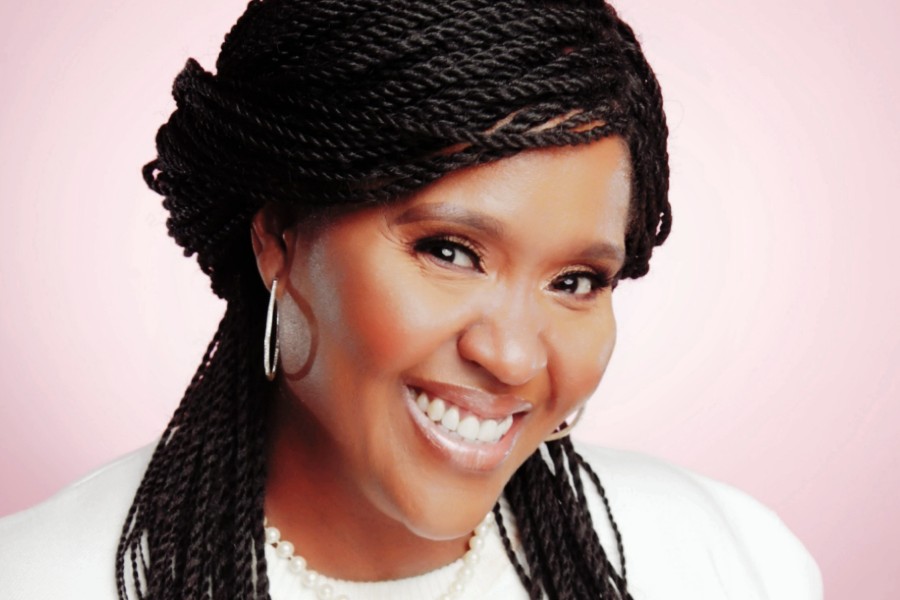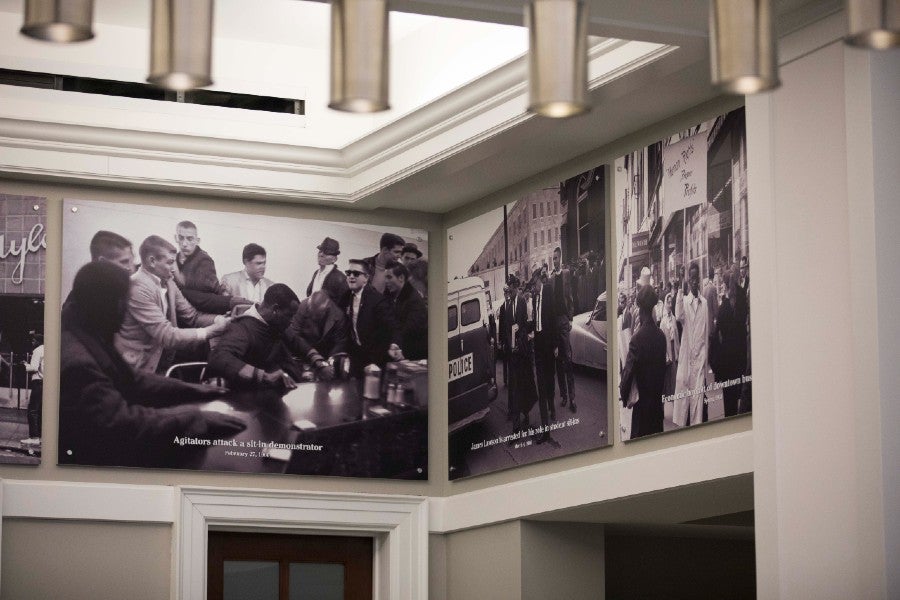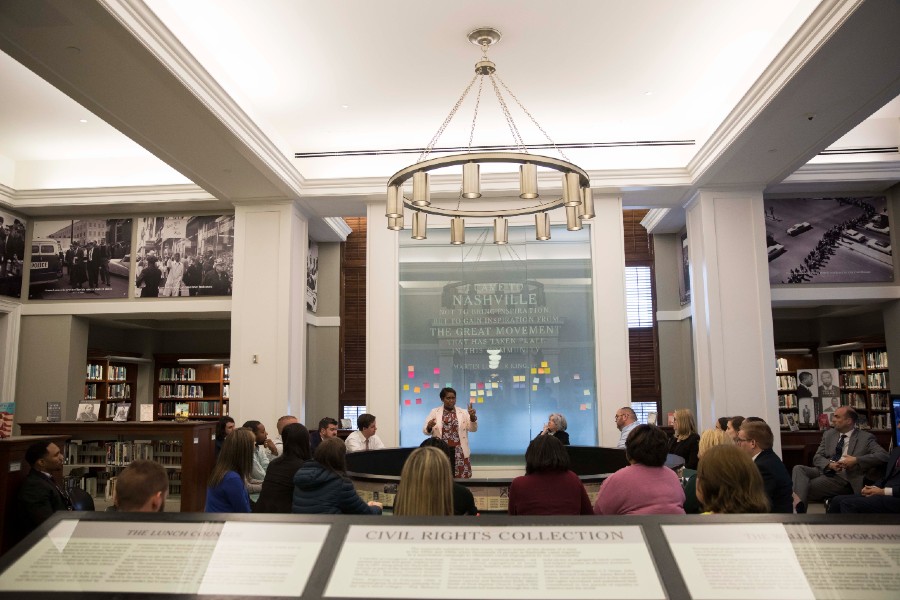Leadership students taught by Nashville’s chief diversity officer
Andrea Blackman continues her long relationship with Lipscomb developing future leaders in the classroom.
Janel Shoun-Smith | 615.966.7078 |

For today’s community development and leadership students, diversity, equity and inclusion will be a crucial aspect of their future roles in nurturing healthy, vibrant communities for all.
So it’s fitting that Lipscomb’s current students can learn from one of Nashville’s most active and innovative community advocates, now tapped to become the city of Nashville’s chief diversity, equity and inclusion officer, to help them create a better society for tomorrow.
Andrea Blackman, formerly the 18-year director of the Nashville Public Library’s civil rights center, was appointed in April to her new position with the finance department of the city. She is also an adjunct professor in the College of Leadership & Public Service, where she can bring her experience of crafting a more diverse and inclusive city today to benefit Lipscomb students who will be leading the cities of tomorrow.
“We’re thrilled she’s here to work on ensuring Metro government reflects the communities it serves,” Mayor Jim Cooper said upon her appointment. “Diversity, equity and inclusion are key to making a city that works for everyone.”
“There are times when you really believe God created me for such a time as this,” Blackman said of the new role. “What is in front of us as a country, city and state is bigger than any one program. The work that needs to be done has to be grounded with stakeholders and people who truly understand what equity work looks like.”
Blackman said she sees her role with the city as a champion, a convener and a catalyst who will “leverage local connections to make sure the city is bringing to light the things we have done well and shedding light on the things we can do better in terms of equity and inclusion.”
In her first month in her new role, she had begun researching the culture of the city overall, to understand the work already being done and the community’s expectations for the future. She collected data and conducted interviews with the city’s departmental leaders, elected officials and staff, business leaders and local diversity leaders. “Moving forward, we will analyze that data and come up with a clear strategy for our city,” she said.

The Nashville Public Library's civil rights center became Blackman's chance to use her community advocacy skills to “engage a new generation of historians” through education.
Community development through historical education
Blackman’s journey from elementary school teacher to chief officer of diversity for a city serving a population of more than 700,000 people, is a testament to her proactive determination to help today’s citizens learn from yesterday’s milestone moments.
After childhood aspirations to become a lawyer and an undergraduate degree in public policy and administration, Blackman began her career as a teacher in Florida. Despite that pivot, Blackman found that her natural advocacy skills could have even greater reach through education.
So when Blackman began at the civil rights room center in 2003, she saw the job as a “blank canvas,” she said, and she proactively worked to paint that canvas with engagement with students. She saw a chance to “engage a new generation of historians,” she said.
“I don’t think it was anyone’s vision at the time that the position would take on the role that it did,” she said of the civil rights center project. “I always said, let’s put civil rights into every classroom in Tennessee–that was always my goal.”
As a curriculum developer, she strove to make sure Nashville’s teachers knew that the civil rights center resources and staff were there to help them develop lessons and co-teach, she said. She eventually hired a facilitator, to help make sure “our schools were comfortable about having these conversations. I wanted to highlight Nashville’s role but a huge part was making sure educators were equipped to teach these issues,” she said.
In 2014, following increased national media attention on the contentious interaction between law enforcement and African American citizens, she launched the Civil Rights and Civil Society program, a cultural engagement education curriculum rooted in lessons learned from the civil rights movement, to be used not just by educators, but to engage police officers, firefighters, community leaders and public officials.
All along the way as she grew the community advocacy reach of the Nashville Public Library, she also often partnered with Lipscomb University to bring the lessons of civil rights movements to local college students.
Let’s put civil rights into every classroom in Tennessee. That was always my goal. — Andrea Blackman
Partnering in creating a 'Beloved Community'
Blackman’s relationship with Lipscomb began first as the parent of a son, Rian, at Lipscomb Academy middle school, and then through various projects with Professor Richard Goode, of the Department of History, Political Science and Philosophy, who coordinated various joint academic projects in 2006 with Fisk University and American Baptist College to teach about Nashville’s crucial role in the civil rights movement.
Goode was a strong ally in Blackman’s drive to link the resources of the civil rights center to educational programs and students all over Middle Tennessee. Blackman, Goode and representatives from Fisk and ABC coordinated a joint history course, special events for students featuring in-person appearances by civil rights movement leaders and the development of a play about Nashvillians experiences during the tumultuous time.
“That partnership led to Lipscomb students being in the room when John Lewis and Dianne Nash were in a room together for the first time again,” Blackman said. “Creating the joint history course for Lipscomb and ABC students was one of the most pivotal points of my career: bringing community engagement and scholarship together. The students created new friendships, and I thought it really became a replica of the original 'Beloved Community'.”

Andrea Blackman, formerly the 18-year director of the Nashville Public Library’s civil rights center, teaches in the center at a Lipscomb leadership workshop.
Lipscomb’s partnership with Blackman continued in 2010 when Lipscomb students help collect interviews for the Flood 2010 Oral History Project and in 2014 when they helped to carry out Nashville New Faces, a StoryCorps@your library project to record, share and preserve oral histories from people of all backgrounds.
Later, Goode pulled Blackman back into the classroom through the Lipscomb Initiative For Education, the LIFE program, that he established to bring for-credit higher education to the women of the Debra K. Johnson Rehabilitation Center (formerly known as the Tennessee Prison for Women).
Blackman taught a course on the literature of liberation at both the Johnson Center and the Riverbend Maximum Security Institution and co-taught a course on civil rights history alongside Goode.
Michelle Steele, associate dean of academics at the College of Leadership & Public Service and director of the Department of Urban Studies, met Blackman through the work of the library’s civil rights center, and last year she approached Blackman about teaching as an adjunct in the college’s community development programs.
Blackman teaches Wealth, Poverty and the City in the urban studies program and Community Development in the leadership and public service graduate program.
With her unique experience in diversity advocacy through education and now in public service, Blackman says “I am hoping I will bring a different perspective in terms of human development and leadership in that program.”